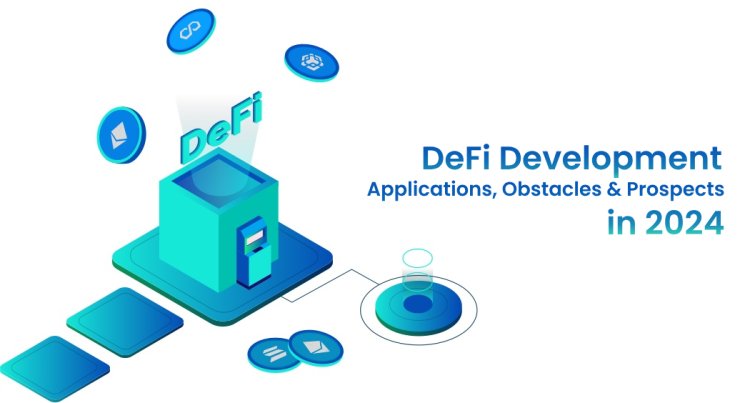DeFi Development - Applications, Obstacles & Prospects in 2024
This blog explores the diverse use cases, potential obstacles, and future outlook of DeFi, emphasizing the vital role of a DeFi Development Company in this dynamic sector.
Share this Post to earn Money ( Upto ₹100 per 1000 Views )

Decentralized Finance, commonly known as DeFi, continues to reshape the financial industry by providing open, transparent, and permissionless financial services. As we look ahead to 2024, DeFi presents numerous opportunities and challenges.
This blog explores the diverse use cases, potential obstacles, and future outlook of DeFi, emphasizing the vital role of a DeFi Development Company in this dynamic sector.
Use Cases of DeFi Development
1. Lending and Borrowing Platforms
DeFi has revolutionized lending and borrowing by enabling peer-to-peer transactions without intermediaries. Platforms like Aave and Compound offer users the ability to lend their assets to earn interest or borrow against their holdings, providing more control and flexibility over their financial activities.
2. Decentralized Exchanges (DEXs)
Decentralized exchanges like Uniswap and SushiSwap enable users to trade cryptocurrencies directly from their wallets. By removing the need for central authorities, DEXs provide greater security, privacy, and user control, making them a superior alternative to traditional exchanges.
3. Stablecoins
Stablecoins are digital assets pegged to stable assets like the US dollar, reducing the volatility commonly associated with cryptocurrencies. DeFi platforms leverage stablecoins for lending, borrowing, and trading, offering users a reliable medium of exchange and store of value.
4. Yield Farming and Staking
Yield farming and staking have become widely adopted strategies for earning rewards in the DeFi ecosystem. By locking up their assets on platforms like Yearn Finance and Synthetix, users can contribute to liquidity and network security while receiving attractive returns.
5. Decentralized Insurance
DeFi insurance platforms like Nexus Mutual provide coverage for smart contract vulnerabilities and other risks. These platforms use decentralized protocols to evaluate and distribute risk, adding an extra layer of security for DeFi users.
Challenges in DeFi Development
1. Security Concerns
The decentralized nature of DeFi platforms can expose them to hacking and smart contract exploits. To protect user funds and maintain trust in the ecosystem, implementing strong security measures and conducting regular audits are crucial.
2. Scalability Problems
As DeFi continues to expand, scalability remains a pressing concern. Increasing transaction volumes can cause network congestion and higher gas fees. To address these issues and enhance user experience, DeFi Development Companies are investigating solutions such as layer-2 scaling and sharding.
3. Regulatory Hurdles
The regulatory environment for DeFi is still developing, with many governments and regulatory bodies seeking to establish oversight frameworks. Balancing regulatory compliance with the decentralized ethos of DeFi presents a significant challenge for developers and platform operators.
4. Liquidity Issues
Maintaining sufficient liquidity across DeFi platforms is crucial for smooth transactions and minimizing slippage. DeFi Development Companies need to implement strategies to attract and retain liquidity providers, ensuring a robust and liquid ecosystem.
Future of DeFi Development in 2024
1. Interoperability Enhancements
Interoperability between blockchains and DeFi protocols will be a key focus in 2024. Solutions like cross-chain bridges will enable seamless asset transfers and interactions across various platforms, fostering a more interconnected and efficient DeFi ecosystem.
2. Improved User Interfaces
User experience will remain a priority, with DeFi platforms striving to develop more intuitive and user-friendly interfaces. Simplifying complex processes will help attract a broader audience and drive mainstream adoption of decentralized finance.
3. Institutional Integration
Institutional interest in DeFi is on the rise, with many traditional financial institutions exploring decentralized finance opportunities. DeFi Development Companies will focus on creating institutional-grade solutions that include compliance features and robust risk management tools.
4. Hybrid Financial Solutions
The future will likely see increased integration between DeFi and traditional finance. Hybrid solutions that combine the benefits of decentralized and centralized systems will emerge, offering comprehensive financial services that cater to a wide range of users.
Conclusion
DeFi development is spearheading a financial revolution, providing innovative solutions that challenge traditional financial systems. A DeFi Development Company plays a pivotal role in this transformation, addressing challenges and driving the future of decentralized finance. As we move through 2024, the ongoing advancements in DeFi promise to create a more inclusive, efficient, and transparent financial ecosystem.
By partnering with a DeFi Development Company, businesses, and individuals can harness the potential of decentralized finance, unlocking new opportunities and fostering the next wave of financial innovation.
















